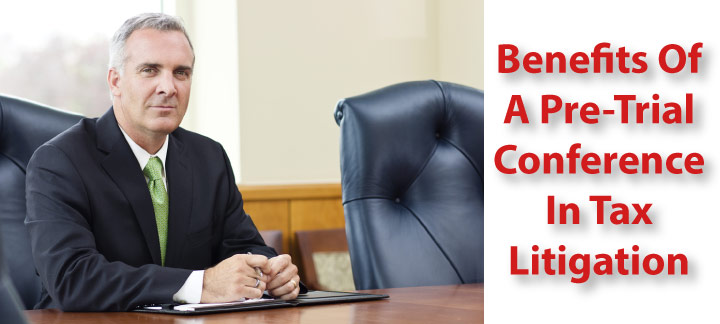Pre-Trial Conferences in Tax Litigation
Although pre-trial conferences are not a typical occurrence in tax litigation, the Tax Court will occasionally allow them to take place to address intractable disputes between the parties. In tax litigation, it is generally the responsibility of the parties to develop the case from pre-trial work through trial, but when disputes arise, the parties can request the Tax Court to officiate over a pre-trial conference. Alternatively, the Tax Court may order a pre-trial conference of its own accord at any time for the purposes of narrowing the issues, stipulating facts, streamlining the presentation of evidence, and otherwise preparing the case for trial. Because the Tax Court is largely based in Washington, D.C., these conferences typically take place over the telephone.
If handled correctly, a pre-trial conference can be very beneficial to the taxpayer because it allows the parties to narrow the issues, authenticate documents and evidence, lay a foundation for the examination of witnesses at trial, and decrease the costs of litigation.
How Should a Party Request a Pre-Trial Conference?
When making a request or motion for a pre-trial conference, the party or parties should include a statement containing the reasons for the request. In order to sufficiently inform the court of the nature of the issue, the request or motion should include subject matter of the underlying request as well as a certain degree of detail. The parties may also request a pre-trial conference through a telephone request to the chambers of the judge assigned to the case. If making a request by telephone, it is best to do so on conference call with all parties present because the Court generally disfavors ex parte correspondences.
If the court believes that the request is due to solely frivolous reasons or to delay the proceedings, it will be rejected. Also, the pre-trial conference is no substitute for the pre-trial stipulation process but it can be used to resolve any differences that arise and are unable to be resolved by the parties during stipulation.
What to Expect at the Pre-Trial Conference
The pre-trial conference can provide an opportunity for the taxpayer to gain some strategic advantage over the opposing party. In order to take advantage of these opportunities, it is helpful for the taxpayer’s counsel to remember some key points:
- Avoid divulging your complete trial strategy to the opposing party. Although it is a great idea to cooperate with the opposing party there is no need to reveal too much. To avoid revealing too much during the process, the taxpayer’s counsel should review his or her proof outline, trial plan, and FRCP 26(a) disclosures. Keep track of those areas for which you have information but the opposing counsel does not, and limit discussion to topics on which both parties are informed.
- Ask the opposing party to provide “trial ready” exhibits and demonstrative evidence. This is important so ensure that the taxpayer’s counsel is not blindsided at trial by never-before-seen trial exhibits.
- Remember that one of the goals of the final pre-trial stipulation is no nail down the witness list that will be used at trial. To ensure that there are no surprise witnesses at trial, taxpayer’s counsel should insist that the opposing party provide a complete list of expected witnesses during the pre-trial conference. Similarly, taxpayer’s counsel should attempt to provide a complete witness list as well because attempts to add witnesses at the trial phase will typically be rejected by the court.
After the Pre-Trial Conference
After the pre-trial conference is concluded, the parties will be called upon to draft the final pretrial stipulation. As a general matter, the taxpayer’s counsel should take the responsibility of drafting this document if possible. By drafting the final stipulation, the taxpayer’s counsel can choose the language used, gain a detailed knowledge of the content and interpretation of the stipulation, and be better prepared for the final pretrial conference with the Tax Court. After the final pre-trial stipulation is drafted, it should be sent to all counsel with enough time for each party to respond. Once all parties have reviewed and approved the final stipulation, counsel for each party should sign the document.
Once you have had the opportunity to review the opposing party’s witnesses and exhibits, you should prepare any objections you may have. The Tax Court’s pre-trial order will state a time period within which objections must be filed; it is of crucial importance to file any objections within this time period specified by the court. Any objections not filed within the time period specified by the court will usually be rejected or waived by the court, unless based on relevancy. Finally, if the taxpayer’s counsel believes that the opposing party’s claims or defenses are frivolous, such objections can be handled by the court’s Final Pre-Trial Order.
Once the final pre-trial stipulation is completed and signed, it should be filed with the clerk of the court. In some cases, the Tax Court judge presiding over the case may require a courtesy copy to be filed with the court as well. A final copy of the document should also be sent to all parties and their counsel.
How a Tax Attorney Can Help with Your Tax Litigation
If you are contemplating a deficiency litigation, then you must consult with an experienced tax attorney. San Diego Tax Attorney William D. Hartsock has been successfully helping clients with tax issues since the early 1980s. Mr. Hartsock offers free consultations with the full benefit and protections of attorney client privilege to help people clearly understand their situation and options based on the circumstances of their case. To schedule your free consultation simply fill out the contact form found on this page, or call (858) 481-4844.



Comments (0)